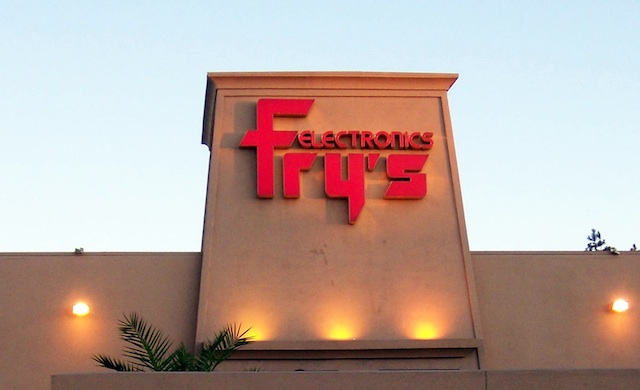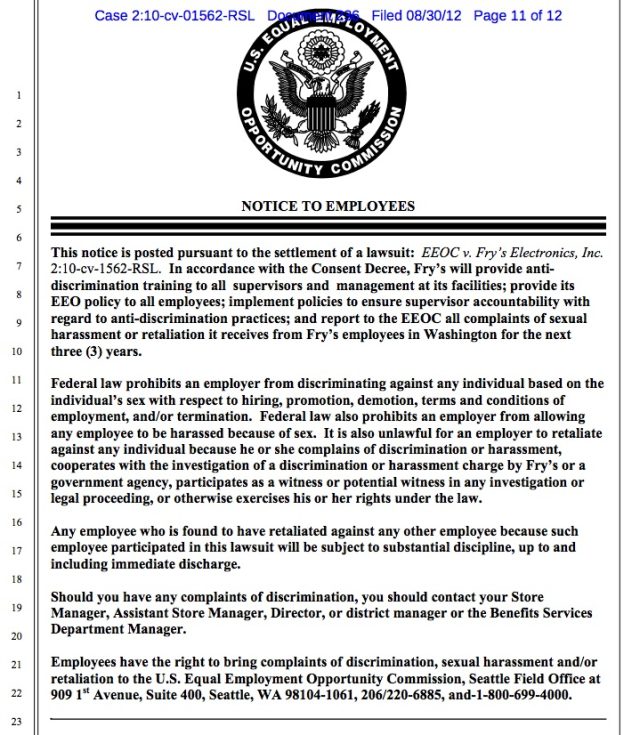
In 2007, 20-year old America Rios was working in the Fry's Electronics store in Renton, Washington when she said that the store's assistant manager took a liking to her. Over the next few months, she said that the assistant manager repeatedly sent her text messages which "commented on how good she looked, offering her alcohol even though Ms. Rios was under age 21, inviting her to his home, and making references to wanting to play with Ms. Rios' breasts." She said the messages continued after she asked the man to stop.
So she went to her immediate supervisor, Mr. Ka Lam, with the problem; he alerted Fry's upper management, who put the Renton store manager in charge of the investigation. But Lam said that the store manager was personal friends with the assistant manager and that he did not even take written statements from Lam or Rios. Within a few weeks of escalating the complaint, Lam found himself fired.
The US government then got involved after Lam complained to the Equal Employment Opportunity Commission (EEOC), which opened an investigation and later filed a lawsuit against Fry's in 2010.
Over the course of the suit, Fry's attorneys tenaciously resisted the government's discovery attempts—perhaps too tenaciously. Things got so bad that on July 3 of this year, Judge Robert Lasnick issued a thundering order in which he said that Fry's had "spoliated evidence," including computer hard drives, that the company only turned over some relevant information after the judge ordered them to conduct "a second search," and that Fry's "intentionally" took until May 2012 to reveal that both of the Renton managers involved in the case had been the target of sexual harassment complaints. Though the judge couldn't prove it, the evidence also led him to believe that the store manager who oversaw the Rios investigation took notes on what he found—but that these had "been removed from the files where one would expect to find them.”
The judge called the behavior “unfair, unwarranted, unprincipled, and unacceptable,” and said that, on the whole, it led him to “doubt defendant's complete commitment to candor and highlighted the very real possibility that the integrity of the judicial process has been compromised."
Because the Fry's team had "deliberately engaged in deceptive practices," the judge said, he hit them with $100,000 in sanctions—$25,000 each to the court, the EEOC, Rios, and Lam. (Fry's outside attorneys apologized to the court for their "error" in not disclosing certain information and for "any other fault the Court finds," but insisted that the problems had largely been misunderstandings, not intentional deception.)

This month, the case finally dragged to its conclusion after the two sides finished presenting their case to a retired judge acting as an arbiter. Before he ruled, however, Fry's settled the claims today, admitting no wrongdoing. Ka Lam gets $1,564,000 for damages, lost wages, and attorney's fees, while Rios gets $736,000.
"This was my first job, and I just wanted the harassment to stop. It really meant a lot to have my supervisor speak out for me, and it was horrifying to see him lose his job over it," said Rios in a statement today. "I'm elated and relieved by the settlement, for Ka Lam's sake as much as for mine."
In addition, the EEOC consent decree with the company forces it to provide two hours of harassment training each year to executives and managers, and to make them "personally accountable" for enforcing Equal Employment Opportunity policies.
Finally, in Washington state, where the alleged harassment took place, the following poster must be tacked to the employee notice board at every Fry's store for the next three years.

"This seven-figure settlement, among the highest EEOC settlements ever on a per-claimant basis, follows court-ordered sanctions including a penalty of $100,000 due to Fry's abusive discovery tactics which included destroying relevant evidence, wrongfully withholding evidence, and filing frivolous motions," said EEOC General Counsel P. David Lopez in a statement. "The case should send a clear message that sexual harassment of vulnerable employees remains a serious problem in this country, as is employer retaliation against those who report harassment."
reader comments
103